Thousands of Pennsylvanians could be at risk of losing the heating assistance they rely on each winter if the Low-Income Home Energy Assistance Program (LIHEAP) comes to an end, according to several advocacy groups.
LIHEAP is a federal program that helps low-income families pay their heating bills. In Pennsylvania alone, it supports hundreds of thousands of residents during the cold months, many of whom are elderly, disabled, or have children.
Advocates say ending this program could have a devastating impact, especially as heating costs continue to rise.
Without LIHEAP, families who are already struggling may have to choose between keeping their homes warm and paying for food, medicine, or rent. The financial burden would fall heavily on households with fixed or limited incomes.
According to officials, more than 300,000 Pennsylvania households were helped by LIHEAP last year alone.
Public officials and community leaders are now urging the federal government to continue funding the program. They argue that energy assistance is not just a benefit—it’s a lifeline. In cold states like Pennsylvania, where winters can be severe, heating is a basic need, not a luxury.
Caring for vulnerable populations is a priority, say advocates. If the funding dries up, it won’t just hurt families—it will also increase pressure on local shelters, hospitals, and emergency services. Some fear that more people will be forced into unsafe living conditions without reliable heat.
Many residents don’t realize how much support LIHEAP provides until they’re no longer eligible or until the program disappears. That’s why officials are encouraging the public to contact their lawmakers and demand continued support for LIHEAP.
The program is funded by the U.S. Department of Health and Human Services and operates through the Pennsylvania Department of Human Services.
If Congress does not renew or extend funding, the program could be scaled back or shut down in the coming years.
For now, people who need assistance can still apply for LIHEAP while it remains active. However, the future of the program is unclear, and many are hoping state and federal leaders will step in before it’s too late.






